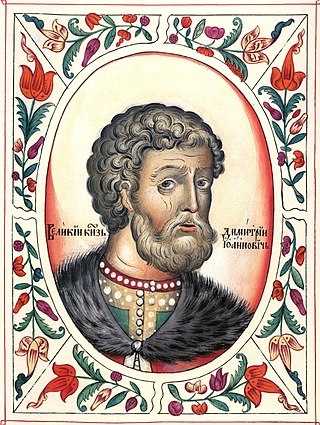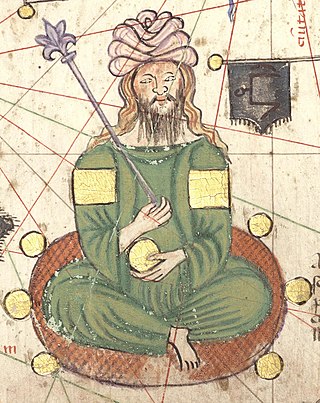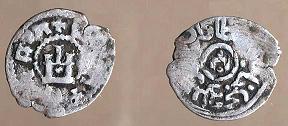
The Golden Horde, self-designated as Ulug Ulus, was originally a Mongol and later Turkicized khanate established in the 13th century and originating as the northwestern sector of the Mongol Empire. With the division of the Mongol Empire after 1259, it became a functionally separate khanate. It is also known as the Kipchak Khanate or as the Ulus of Jochi, and it replaced the earlier, less organized Cuman–Kipchak confederation.

Dmitry Ivanovich Donskoy was Prince of Moscow from 1359 and Grand Prince of Vladimir from 1363 until his death. He was the heir of Ivan II.

Giyasuddin Muhammad Uzbek Khan, better known as Uzbeg, Uzbek or Ozbeg (1282–1341), was the longest-reigning khan of the Golden Horde (1313–1341), under whose rule the state reached its zenith. He was succeeded by his son Tini Beg. He was the son of Toghrilcha and grandson of Mengu-Timur, who had been khan of the Golden Horde from 1267 to 1280.

Jani Beg, also known as Janibek Khan, was Khan of the Golden Horde from 1342 until his death in 1357. He succeeded his father Öz Beg Khan.

Dmitry Konstantinovich was Prince of Suzdal and Grand Prince of Nizhny Novgorod-Suzdal from 1365. He took the title of Grand Prince of Vladimir from his son-in-law, Dmitry Donskoy, from 1360 to 1363. The famous Shuisky family descends from his eldest son, Vasily Kirdyapa.
Descent from Genghis Khan in East Asia is well documented by Chinese sources. His descent in West Asia and Europe was documented through the 14th century, in texts written by Rashid-al-Din Hamadani and other Muslim historians. With the advent of genealogical DNA testing, a larger and broader circle of people have begun to claim descent from Genghis Khan owing to dubious and imprecise haplogroup identifications. However, while many of Genghis Khan's agnates' resting places are known, none of their remains have been tested to prove or disprove these theories and debate continues.
Urus Khan was the eighth Khan of the White Horde and a disputed Khan of the Blue Horde; he was a direct descendant of Genghis Khan. Urus himself was the direct ancestor of the khans of the Kazakh Khanate.
Little is known about Toqtaqiya except that he was a son of Urus Khan and was Khan of the White Horde for less than a year. In this time, he defeated his cousin Toqtamish and drove him from Sabran. He died shortly after this victory, just a few months after Urus.
Temür Malik, also spelled Timur-Malik, the son of Urus Khan, was the ninth Khan of the White Horde. Early during his reign, he successfully invaded the lands of his cousin Toqtamysh. However, Toqtamysh later managed to trap and kill Timur-Malik near Qara-Tal, and succeeded him.

Shiban (Sheiban) or Shayban was a prince of the early Golden Horde. He was a grandson of Genghis Khan, the fifth son of Jochi and a younger brother of Batu Khan who founded the Golden Horde. His descendants were the Shaybanids who became important about two centuries later.

QulpaKulpa and Askulpa in Russian chronicles; Colbadinus Cam in a contemporary Venetian document; died 1360) was Khan of the Golden Horde from August 1359 to February 1360. He came to the throne four days after the murder of his predecessor Berdi Beg. It has been supposed that Qulpa might have begun his reign as a rival khan at Azov, but that cannot be verified and seems unlikely. His short reign is not recorded in most of the Perso-Arabic narratives treating the khans of the Golden Horde, but it is briefly treated in the Russian chronicles, which report that Qulpa reigned for 6 months and 5 days, did a lot of evil, and in the end was killed, together with his sons Mihail and Ivan. The names of Qulpa's sons and the absence of a traditional Muslim name on his coins suggest that he was Christian, but that is not certain. The publication of a contemporary Venetian notary act by Benedetto Bianco confirms Qulpa's favor towards Christians and that at least his eldest, 12-year-old son was a Christian; it also dates the murders of Qulpa, his two sons, and two emirs, and the accession of the next khan, Nawruz Beg, to 28 February 1360. Qulpa's control over the Golden Horde may have been challenged from the start, by Berdi Beg's son-in-law Mamai in the west, and by the reassertion of autonomy in the former subordinate Ulus of Orda in the east, under Qara Noqai, a descendant of Jochi's son Toqai Temür.

Nawruz Beg was Khan of the Golden Horde in 1360.
The Qara'unas or Negüderi were the Mongols who settled in Afghanistan after moving from Turkestan and Mongolia.
Mubarak Khwaja was the khan of the White Horde in 1320–1344. He succeeded his brother, Ilbasan, with the assistance of Uzbeg, Khan of the Golden Horde and the House of Batu. However, he declared his independence from Sarai. The Khan sent his son Tini Beg to overthrow him. Thus, he was replaced by Chimtay, son of Ilbasan. He may have lived longer after his dethronement, occupying some lands.
The Wings of the Golden Horde were subdivisions of the Golden Horde in the 13th to 15th centuries CE. Jochi, the eldest son of the Mongol Empire founder Genghis Khan, had several sons who inherited Jochi's dominions as fiefs under the rule of two of the brothers, Batu Khan and the elder Orda Khan who agreed that Batu enjoyed primacy as the supreme khan of the Golden Horde.

Dawlat Berdi, also known as Devlet Berdi, was Khan of the Golden Horde who reigned from 1419 to 1421, and again from 1428 to his death in 1432. He was the son of Jabbar Berdi and a descendant of Berke Khan.
Mahmud Astrakhani was one of Küchük Muhammad's sons and a Khan who founded the Khanate of Astrakhan in the 1460s.
Ordu Malik, was briefly Khan of the Golden Horde in 1361, having replaced his rival Timur Khwaja.







